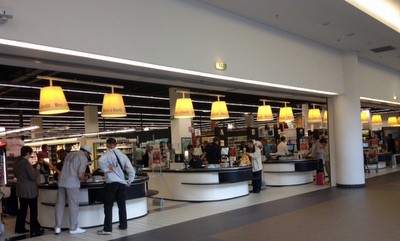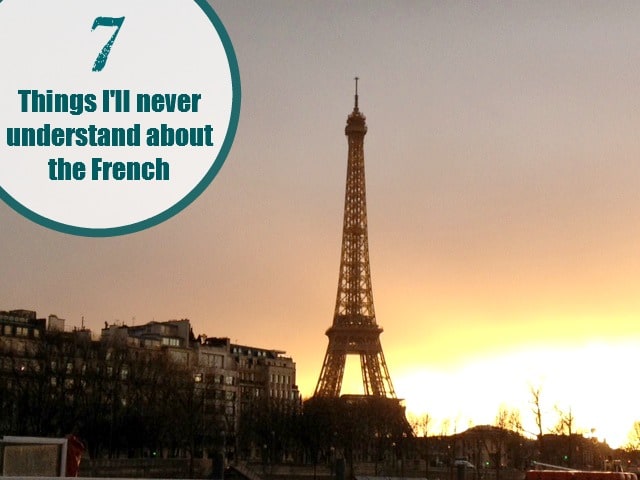Once upon a time, I arrived in France thinking I could speak halfway decent French and knew enough about the French way of doing things that I’d be right at home. But as time went on and I started to interact with more French people, go out to eat and go about my day-to-day life, I realized that I didn’t know as much as I had thought.
Here are the biggest French faux pas you can commit and why I think #7 is the worst.
French faux pas
This is by no means an inclusive list and it’s not the end of the world if you commit a faux pas below, but they are things to keep in mind when adapting to French culture.
Here are few of my favorite French faux pas:
Food
1. Eating dinner before 7 p.m. In some circles, a meal before 8 p.m. might be a no-no! Back in the U.S. when I was young, eating dinner at 6 p.m. on a cold winter day was normal. It was dark, we were hungry and it was time to eat. Not so in France. Dinner seems to be no earlier than 7 p.m. and even that is on the early side. 8 p.m. is pretty normal and 9 isn’t too strange. I’ve definitely had to adjust my habits.
2. Asking for a well-done steak. I think it pains my father-in-law to char my steak to the point of being well-done so at this point, I just eat the meat medium and I’ve actually gotten used to it. I actually eat a ton of meat in France.
3. Eating your salad before the main course. The French eat their salad to finish the meal, not to start it! This varies by region somewhat but generally a salad is eaten after the main dish.
Wow your French dining companion with my must-read tips >>
4. Touching fruit at the marché. Sometimes there are signs to remind you to keep your paws off the produce, so if you see one, obey! The vendors will handle it for you most of the time — just point. (I wrote a piece on marché know-how here if you’re curious.)
Dining etiquette in France: How to wow your French dining companion! >>
Social
5. Friendly conversations getting too friendly. Beyond a simple hi and small talk about the weather, French people respect others’ personal boundaries and don’t do small talk the way we do it in the U.S.
I found out after the fact that asking my pharmacist (who I’d known for a year at that point) about his family vacation wasn’t normal, polite conversation (where it would be in the U.S.). Oops. Tom wrote about the social differences in this Ask Tom Tuesdays post. Also, small talk in France is nuanced. I explain it in the linked post.
6. Being too direct. There are subtle nuances to the French language that you might not notice at first, but they’re there. Sometimes Tom’s email interactions or phone conversations with customer service employees sometimes leave me chuckling and wondering why it seems like we’re almost apologizing for bothering them about the company’s mistake.
In regular conversation, skipping the niceties to get the point might seem too abrupt or even rude to a French person. So do like the French do and always be polite. Definitely lead with the magic word bonjour!
7. Going in for a hug instead of bisous. The first time I met my now father-in-law, I greeted him with a big, friendly American hug. And he just stood there, frozen. I learned real fast not to repeat the greeting with my mother-in-law.
You see, French people find hugs extremely intimate (read: reserved for lovers) and instead greet friends and family with cheek kisses called bisous. The French would not only be surprised and find it awkward to hug (how long do we hug for?, where do I put my arms?, do I hug back?, etc.), but they’d be extremely embarrassed and find the whole exchange super uncomfortable due to the physical contact. Trust me on this French faux pas!
8. Mixing up tu and vous. Tu and vous both mean “you” but it’s not always so cut and dry. If you’re a foreigner, you’ll be forgiven for this French faux pas, but remember that if you don’t know the person well or they’re in a position of authority (doctor, cop, old lady at the grocery store), or you’re addressing several people, use vous.
If you’re not sure, always err on the side of caution and use vous (except with kids).
9. Addressing someone by their first name. The French are formal when it comes to many things and addressing someone you’re not really friends with by their first name is a no-no. It really might not seem like a big deal but it is a major gaffe. So your pharmacist is Mr. DuPont, not Pierre. The client at work is always Mr. French Guy.
Basically, anyone you don’t interact with on a daily basis — or anyone in a professional context — gets a Monsieur or Madame unless they tell you otherwise. The French keep that distance and don’t get too familiar. I have to force myself to do this and if anyone calls me Madame My Last Name, I always say, no no it’s Diane! (Tom just admitted, “Sometimes it’s so weird in French.” Agreed.)
10. Forgetting your manners. Upon entering a store, say bonjour and make sure you say au revoir upon exiting. That’s good life advice anywhere! When arriving in a doctor’s waiting room, say hi to everyone as you sit down. It’s really bad form to forget simple words like merci and bonne journée.
Be more socially polite than your American instincts tell you to be and you should be just fine. It’s the French way! And here are a few must-know French words that’ll help you nail that whole French politeness thing.
What do you have to add to my list of French faux pas?
PIN IT:








A few weeks ago I went to the Braderie de Bordeaux and ended up using both the informal tutoiement and formal vouvoiement in the same sentence when asking a question to a vendor. As soon as the sentence was out of my mouth I realised my error. I just wanted to get out of there asap as I felt so ashamed I couldn’t bear to look at the vendor. I made some lame excuse and scurried off like a mouse.
Yah, really easy mistake to make. I used the “tu” form with a waiter at a nice restaurant the other day. Ooopsey. People know we’re foreign though so it’s OK
People are indulgent about it if you are foreigner.
If they are not, they are a**holes 🙂
How would you advise for #7 if you meet a French person for the very first time? In my case, I will be picked up at CDG by a French man through mutual friends. Should I just offer my hand or offer my cheek?
Thanks.
Hi Meagan, I’d offer your hand and see if he leans in. Depending on how well you know him, bisous are probably appropriate though. What’ll probably happen is that you offer your hand and he’ll lean in for bisous. So I’d say expect that. 😉
Hey! Here is my advice as a French girl : fell the temperature: if he feels friendly and close lean for a cheek kiss (it’s called bise) or else shake hands
Be careful not to ask for a bisou since it’s a kiss on the lips (French kiss is a baiser)
Between 2 boys it’s usually a hand shake unless you are family
Hi Nina, thanks so much for stopping by and taking the time to comment! I always refer to the cheek kisses as “doing bisous.” OOPS! I guess I should stop that. Aside from my husband and his family, the only people who do bises with me are the manager at the gym and another client there that works out at the same time as me. So I don’t have that much practice. Still difficult for me to know when to start with just a “hi” or a bise. Happy (almost) New Year!
Hmm I’m a French girl too and I somehow wasn’t aware that “bisou” means “kiss on the lips”. Bisou is simply a word for kiss, and can mean a cheek kiss as well. It’s generally used by children or between close family and friends. It’s got a cute and childish kind of connotation, so as nina said, I wouldn’t recommend using the word with anyone you’re not very close to though.
Saying hello to everyone in the Doctor’s office waiting room was pretty funny to me when it first happened. I also notice that you should say hi to everyone at the laundromat when you enter too!
Yup, I pretty much say hi to everyone everywhere!
You say hi everytime you enter a small space : doctor, shops, places where you have to wait…
Exception for transports (you do say bonjour to a taxi though)
Even in the elevator at work where there are 6000 employees some you haven’t seen before and don’t work with(generally women) will automatically say “have a nice day” when leaving the lift. I find that hypocritical, you can see they absolutely don’t give a damn, but that they do it to conform to the norm. Either I don’t answer or when I want to make fun of them I answer loud “thank you Ma’am!”
Great guide!
Thank you, Alan!
Great article. I agree with all of them. When I order a burger at a restaurant I need to ask dead cooked otherwise it’s still a bit red inside. Its because we’re thinking mad cow, mad cow…. haha
And for the doctor’s waiting room (or enterring a small store), that was a big shock when I heard people say Bonjour.
Thanks for checking it out. 😉 Yes, I always say “bien cuit, brule” because their “burned” is my well done. My favorite (just heard it yesterday at the doctor) is when someone enters, usually older people this, and they address the group with a Monsieurs-dames. I like that one for some reason. Have a great weekend!
Yes, all the time and everywhere you have to say “bonjour”, so fake, now to make fun of them everytime I pass a French lady in the street I mumble “‘jour maam” , those who notice appreciate that tremendously , they are so hollow.
So right and especially #1 and #7. I’m French and I’ve been in Texas for 2 years. I’m still not used to “hugging”. But I miss “bises” and hand shaking. Over here, you don’t do the “bise” but also, you shake hand only the first time you meet someone. Back in France, I used to do the “bise” to female colleagues and to shake hand with male colleagues every morning.
Yes, hugging is weird. Even as an American, sometimes it can feel oddly intimate depending on how close you get. I should do a post with some illustrations on the types of hugs. Some are less intimate and more normal with people you don’t know that well. You would handshake every morning at work? I think in the US it’s customary to say hey what’s up and that’s about it. I like some of these French customs a lot. 😉
As a result of continually brainwashing myself from being too formal with people I shouldn’t have (like vousvoying friends of friends, hip hair dressers, etc) and feeling like an ice queen, I try extra hard to tutoie people I find cool. Well in the middle of my last job interview, I was asking a question about something, and I said “Ca serait toi ?” and I swear I could hear the “toi toi toi toi toi” echoing in the silent room after. I was basically apologizing for the rest of the interview. Got the job though, so all is not lost despite what we may think at the moment of the crime.
Another hard thing to get used to is using the proper time of day when greeting. Like saying “Bonne journée” too late in the day instead of the proper “Bonne soirée”. I never used to keep track of the time of day, but now I’m on it like a hawk.
Also, when someone responds to your simple “Bonne journée” when leaving someone around 14 with “Bon après-midi”, it’s hard not to feel judged for being lazy or inaccurate (even though they probably just said it as a reflex, having prepared the correct phrase subconsciously).
Hahah yes I never know when to switch over to bonsoir from bonjour. Usually around 6 p.m. is a good rule of thumb. But I even hear French people saying bonjour sometimes after it gets dark. So I think we get a pass on that one. I’ll check out your blog. Thanks for stopping by.
You say bonsoir when it’s dark : if a French says bonjour it’s just a slip of tongue. Don’t worry.
Also bonne apres midi is said if it’s already past noon, if you are unsure stick to bonne journee, you won’t commit a faux pas (if it night already, bonne soiree!)
I said bonsoir to someone the other day at 11 am. Total slip of the tongue. Happens to the French and non-French alike!
Oh wow, I’ve committed SO many faux pas, it seems.
In France, you sometimes have a “conseiller” at the banque who is responsable for your accounts. I was to e-mail him (a man younger than myself) some follow-up documents the first time I opened my bank account, and I opened the e-mail with “Bonjour Benoît”. BAD!
Unless you know the person personally, socially, people do not greet in e-mails with first names. Ever. There is an awkward transition phase, however, where you can tell the other person also is not sure how they may address you in the e-mail. For example, an extended hiring process can see much “getting to know you” and e-mail exchanges, where it starts feeling artificial to continue the Monsieur/Madame front, as you’ll soon be working with each other and tutoying all over the place.
Ok, last one! Also apparently a faux pas in France is using “Bonjour” more than once in a back and forth e-mail exchange, as “Bonjour” is a greeting meant to be used once a day. If you don’t know the person well enough, you cannot resort to “Salut” either, so I’ve seen people drop the greetings off from the second e-mail (of the same day- on, probably because they don’t have any viable options either. If SOMEWHAT informal, I’ve seen “Rebonjour”, but this is kind of casual and NOT to be used with the bank/administration/etc.
Pretty funny. Excepting the chapter about the food, these rules are suitable to follow when you’re in Brazil also! Xxx
Cool, glad you enjoyed the post! I think many of them apply in other European countries as well. Would love to hear more about Brazil’s faux pas!
Fun post, even for a french girl ! I agree except for salad, I always eat salad at the beginning of the lunch, with other ‘crudités’, never at the end, same for all the people I know, even if I know that it’s the traditional way, like in restaurants.
The first name, perfectly true : never unless you’re close ! A few days ago, I had to contact the customer support of my mobile phone (‘Virgin’). They have a ‘young’ commercial policy, very friendly tone, and the man ont he phone gave me his first name, then asked me to use mine !! I was badly surprised, I did not refuse because he was very polite, but when I received a mail to ask me to give a feedback about the call, I said PLEASE never ever use my first name : ‘on n’a pas gardé les moutons ensemble’ as we say here ;))
Some of these apply when I am visiting Mexico. Grateful “tu” and “vous” are not so common there, but always forget saying “hello” to everyone when I enter a full waiting room, lol! Makes me feel so rude and out of place.
Hi! Interesting post
It’s fun to see how foreigners see us in France. Most of what you wrote is correct but be careful of your #3 : it’s not unusual at home to finish with salad, because we don’t always eat it… But you are committing a real big faux pas if you ask for salad at the end of your meal in a restaurant! Salad is served first! Always! In any restaurant you will enter… Answer is simple : salad is cold (hence, fast to prepare) so you eat it while the main dish is being cooked
The general order is :
– aperitif
– starter (salad and derived : tomatoes, cold pastas…)
– main course (meat or fish). Sometimes, you can have both, then, it’s the fish first.
– cheese (or another dairy product such as yoghurt)
– Dessert (fruit, pastry…)
Hope you enjoy France 🙂
Btw: you can touch fruit in a marche unless it is explicitly forbidden. It’s not a faux pas so don’t worry about that. When you go in a marche it’s because you want to choose your fruit/vegetable yourself… Else you would go to a shop.
hi nina, thank you for the info! the salad part is tricky because while i’ve never asked for salad in a restaurant at the end of the meal, i have been served a salad after the main dish with the cheese. it was a prix fixe place so maybe that’s more common than when you choose just one thing off a menu? i don’t know. thanks so much for your thoughtful comment!
Oh, boy do I know about #7! Haha! I’ve accidentally given hugs to professional contacts! That was the worst! It’s so embarrassing!
Staying in hotel in SoF when l was leaving on final day of holiday the manager leaned in for la bise. We had chatted briefly and joked a few times but I was a bit flustered. The following time I visited a few months later when I arrived I automatically put out my hand to shake to find that he was about to lean in …then he pulled back & shook hands instead. It was clear to me the next few days he was annoyed. The last time I stayed there Oct 15 when I arrived, determined to get it right I leaned in…he was clearly not happy but went along with it very briefly. I am due to return next May, help what should I do? Btw we are both married so while he was initially a bit flirty it was very harmless. My last few visits he was quite unfriendly so I kept myself to myself beyond a brief smile & “bonjour”.
Hi there, I got from your comment that you’re a woman and for me, someone in a professional setting who you just met, like a manager of a hotel, shouldn’t really be doing cheek kisses with clients. Sure there are exceptions like if you’ve known each other a long time or your families know each other or you all became close over that week of vacation, but you said he leaned in for a bise on the last day of your trip (you didn’t know him prior to the trip, right?). Did you spend a lot of time over the course of the week? This is the hotel manager or a tour manager that was with the group daily?
If it’s a hotel manager who you see on your way in and out and there was no other contact, it seems a little forward and even opportunistic. Was he aware you are married? Cheek kisses are the French way but not really in a professional setting where you are the client and don’t know the person beyond the professional context. He may have been a little offended you didn’t reciprocate with the bise and took it as a snub… maybe he was looking for a hookup or maybe he just wanted to be overly friendly. I don’t know for sure. If it feels right to do a cheek kiss next time, go for it, but if you’re happily married, I’d reject any other types of advances just so he doesn’t get the wrong idea. Hoping there’s some new staff next time so you don’t have to deal with any awkwardness!
My mother in law does la bise to EVERYONE (she is not french) and I die a little inside every time she accosts waiters and anyone with her bise… I think the manager was wrong to do la bise in the first place. It seems oddly overly friendly and not professional
Hi Diane thanks for speedy reply. The guy owns & runs the hotel with his brother. I was there with my mother & sister and we found him very pleasant & helpful re suggestions for restaurants etc. On our last day he offered us a transfer to the airport and when my family sat in the back he opened front passenger door for me. We chatted for 20 minutes about France vs Ireland. As he handed my suitcase to me he leaned in for la bise (my family a bit shocked. I had mentioned my husband & children. I thought nothing of it as he looked about 10 yrs younger than me. As I mentioned on the 2nd visit he seemed annoyed when I shook his hand & on the 3rd visit when I finally thought maybe I should la bise he stayed rigid and when he was checking me in (my sisters had arrived earlier) he mentioned his wife & kids ! I felt awkward and this annoyed me as I had done nothing wrong. I would rather stay elsewhere but my family like this hotel. Think il be keeping my hands by my side & my cheeks to myself next timeReally enjoying your website!
You’re welcome. I was in my blog working on something when I saw your comment. 😉
So I just talked to my husband about this over dinner and his French perspective is in agreement with mine. Unless this is a hotel that you’ve gone to for years and have become very friendly with the owners, the bise seems a bit unprofessional for a first-time guest. When I asked Tom if he thought maybe the guy was looking for some action, he said probably not if he went in for the cheek kiss at the end of the trip when you were leaving for the airport. Maybe he just felt it was the right thing to do (despite it being unprofessional) and thought you’d be fine with it and now he feels embarrassed or dissed and is keeping his distance. The thing with the bise is once you start you do it every time, but that’s in general when it’s a normal thing, not a hotel manager and his client of a different nationality that he doesn’t really know.
If he goes in for the bise in May when you’re there, I’d keep it friendly and reciprocate but don’t initiate it yourself and try to steer clear if the whole thing makes you uncomfortable.
So glad you enjoy the blog!
Salad’s severed both before and after the meal here in Paris–it seems to just depend on the preference of the host and/or restaurant. #9 is changing, too. Titles may still be common in professional relationships, but I imagine that will start to change. Here the school children even refer to their teachers by their first name only. That’s been a strange adjustment for me, as I grew up in the southern US, where that sort of thing was unheard of….